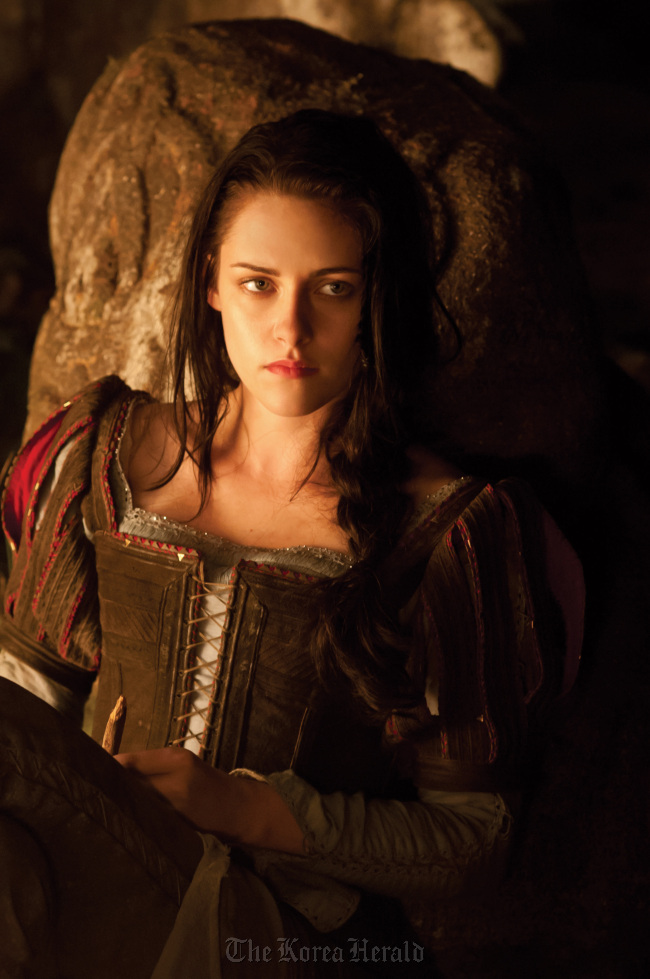LOS ANGELES (AP) ― For modern movie princesses, looking pretty and marrying a prince isn’t enough.
Take “Mirror Mirror,’’ where Snow White rescues her prince from an evil spell, or “Snow White and the Huntsman,’’ where she becomes the hunter who avenges her father, marries none of her suitors and confidently runs her kingdom alone.

Kristen Stewart as Snow White in the action-adventure “Snow White and the Huntsman.” (MCT)

Julia Roberts (left), and Lily Collins, pictured March 22 at the Hotel Amarano in Burbank, California, star in “Mirror, Mirror,” an interpretation of the fairy tale “Snow White.” ( MCT)
Further upending the Cinderella syndrome at a theater near you is Pixar’s first ever female protagonist, the feisty Scottish Princess Merida of “Brave,’’ who demands to forge her own independent future. She’s also a far better shot than any of her would-be princes.
This new breed of big-screen princess not only reflects the independence ― and athleticism ― of young women today, but also Hollywood’s increasing willingness to tell their stories.
The success of “Bridesmaids,’’ “The Girl With the Dragon Tattoo’’ and “The Hunger Games’’ showed us that audiences respond to well-drawn heroes, regardless of their gender, thus setting the stage for the classic literary convention of the princess to get a modern makeover.
“It is time for a new paradigm,’’ said “Brave’’ producer Katherine Sarafian. “We’ve got an opportunity to make more characters that are relatable to modern girls’’ and audiences at large.
These empowered young princesses point to a gradual undoing of the so-called Cinderella syndrome or Cinderella complex, a theory developed in the early 1980s that says that, like Cinderella, many women seek something external ― such as a rich and handsome prince ― to change their lives and harbor a deep desire for dependence.
“It’s not enough for women in the 21st century just to sit around and wait and be pretty,’’ said Karen Sternheimer, a professor of sociology at the University of Southern California. “An empowered heroine encountering a challenge reflects the whole mythology of individualism. What’s new is the means of achieving success. It used to be through beauty or marriage only. That hasn’t gone away, but now it can also be through a skill or encountering a challenge that traditionally we’ve heard in stories about men.’’
In developing Princess Merida’s story in “Brave,’’ Pixar writers and artists thought more about character than gender, Sarafian said. They considered Merida’s motivations, her frustrations and what makes her brave.
“If you focus on her being a girl, it’s easy to get stuck in the trappings and rules and what a princess movie dictates,’’ the producer said. “We strip out gender, princess, fairy tale and just focus on character.’’
Merida, voiced by Kelly Macdonald, is a headstrong teenager in 12th century Scotland with a mane of fiery red curls and a temperament to match. Though her mother lovingly prepares her for her royal role, the young princess is more interested in sword fighting, archery and riding her horse through the forest. When she blatantly defies an ancient tradition, she jeopardizes the future of her family and the kingdom.
“The story is not about the circumstances surrounding her,’’ Sarafian said. “She makes the core decision that throws things off ... and it’s not something else really saving her. Even though there is a little magic in the story, she is really the driving force.’’







